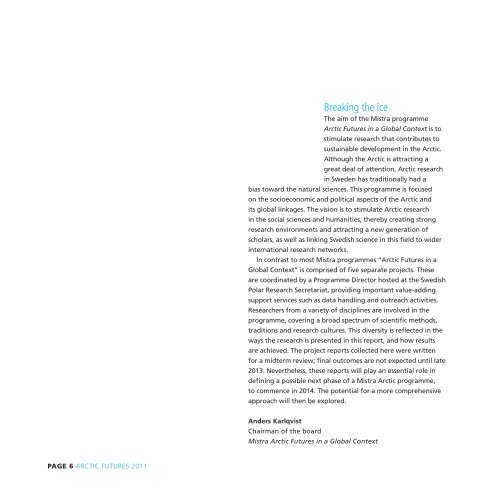Mistra Arctic Futures Annual Report 2011 (pdf)
Mistra Arctic Futures Annual Report 2011 (pdf)
Mistra Arctic Futures Annual Report 2011 (pdf)
Create successful ePaper yourself
Turn your PDF publications into a flip-book with our unique Google optimized e-Paper software.
Breaking the ice<br />
The aim of the <strong>Mistra</strong> programme<br />
<strong>Arctic</strong> <strong>Futures</strong> in a Global Context is to<br />
stimulate research that contributes to<br />
sustainable development in the <strong>Arctic</strong>.<br />
Although the <strong>Arctic</strong> is attracting a<br />
great deal of attention, <strong>Arctic</strong> research<br />
in Sweden has traditionally had a<br />
bias toward the natural sciences. This programme is focused<br />
on the socioeconomic and political aspects of the <strong>Arctic</strong> and<br />
its global linkages. The vision is to stimulate <strong>Arctic</strong> research<br />
in the social sciences and humanities, thereby creating strong<br />
research environments and attracting a new generation of<br />
scholars, as well as linking Swedish science in this field to wider<br />
international research networks.<br />
In contrast to most <strong>Mistra</strong> programmes “<strong>Arctic</strong> <strong>Futures</strong> in a<br />
Global Context” is comprised of five separate projects. These<br />
are coordinated by a Programme Director hosted at the Swedish<br />
Polar Research Secretariat, providing important value-adding<br />
support services such as data handling and outreach activities.<br />
Researchers from a variety of disciplines are involved in the<br />
programme, covering a broad spectrum of scientific methods,<br />
traditions and research cultures. This diversity is reflected in the<br />
ways the research is presented in this report, and how results<br />
are achieved. The project reports collected here were written<br />
for a midterm review; final outcomes are not expected until late<br />
2013. Nevertheless, these reports will play an essential role in<br />
defining a possible next phase of a <strong>Mistra</strong> <strong>Arctic</strong> programme,<br />
to commence in 2014. The potential for a more comprehensive<br />
approach will then be explored.<br />
Anders Karlqvist<br />
Chairman of the board<br />
<strong>Mistra</strong> <strong>Arctic</strong> <strong>Futures</strong> in a Global Context<br />
Beginning of things to come<br />
The <strong>Mistra</strong> programme <strong>Arctic</strong><br />
<strong>Futures</strong> in a Global Context is<br />
halfway through its first phase,<br />
and an evaluation in May 2012 lies<br />
ahead. The projects included in the<br />
programme are already fruitful in<br />
their own rights, and are delivering<br />
according to plan.<br />
The process leading up to the start of this programme<br />
in <strong>2011</strong> was long. Cecilia Dahlberg was the Programme<br />
Director until the beginning of 2012. She developed<br />
a model for collaborating across the projects that the<br />
programme will continue to use, and laid the foundation<br />
for an activity plan that embraces joint meetings and<br />
outreach activities for different stakeholder groups.<br />
The <strong>Arctic</strong> is an emerging issue on global political<br />
and social agendas – even if it has always been a quiet<br />
place – and Sweden needs to be a part of that movement,<br />
preferably through national expertise with international<br />
commitments and outlook. I look forward to leading<br />
and coordinating the activities in this timely research<br />
programme. We anticipate that the wide range of issues<br />
covered by the research projects in this programme will<br />
result in many interesting opportunities for linkages<br />
between the projects; implementing joint outreach<br />
activities is one way of unifying them.<br />
The research programme was represented at the<br />
ICASS VII conference in June <strong>2011</strong>, as well as at the<br />
meeting for Senior <strong>Arctic</strong> Officials of the <strong>Arctic</strong> Council,<br />
in Luleå in November <strong>2011</strong>. Researchers from several of<br />
the projects presented their work at the IPY conference<br />
From Knowledge to Action in April 2012 in Montreal. The<br />
website arcticfutures.se is one of the foremost channels<br />
of communication for the programme. A folder about the<br />
programme was produced in <strong>2011</strong>, and an updated version<br />
was printed for the programme symposium <strong>Arctic</strong> <strong>Futures</strong>:<br />
Increasing Knowledge in Social Sciences and the Humanities<br />
held during the Stockholm Polar Week in March 2012 at the<br />
Canadian Embassy in Stockholm.<br />
Reaching out and interacting with fellow researchers,<br />
stakeholders and policymakers will be important for the<br />
rest of this first programme phase. Swedish researchers<br />
in the social sciences and humanities that are interested<br />
in <strong>Arctic</strong> and Antarctic issues will be coming together and<br />
join ranks in attempt to develop a better position and a<br />
common approach for reaching out to research funding<br />
sources, the international science community and other<br />
target groups for their work. I believe that the <strong>Arctic</strong><br />
<strong>Futures</strong> in a Global Context programme can benefit from,<br />
and provide benefits to, such efforts.<br />
Sofia Rickberg<br />
Programme Director<br />
<strong>Mistra</strong> <strong>Arctic</strong> <strong>Futures</strong> in a Global Context<br />
PAGE 6 ARCTIC FUTURES <strong>2011</strong> ARCTIC FUTURES <strong>2011</strong> PAGE 7


